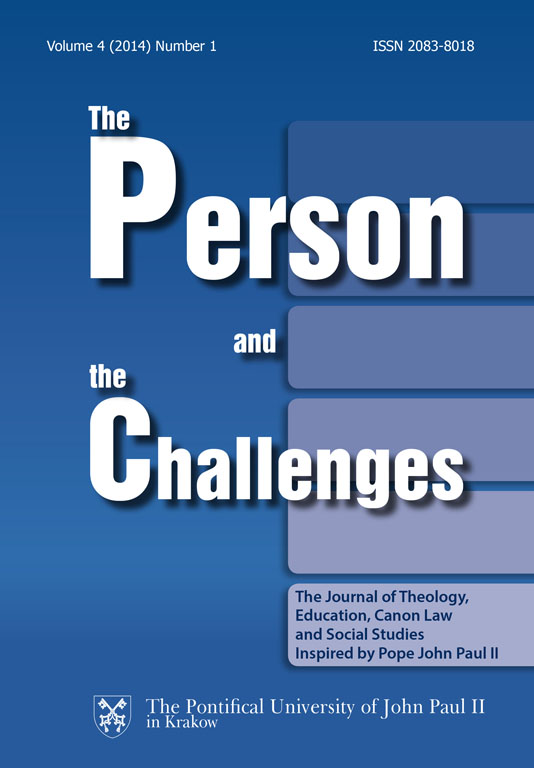From Listening to Hearing the Message
DOI:
https://doi.org/10.15633/pch.49Słowa kluczowe:
Evangelizing, Revelation, language, autology, dectology, community, ChurchAbstrakt
Evangelizing is searching for an appropriate language to hand on Revelation. Demonstrated is a possible use of linguistic theories and educationally-developmental understandings of Vigotsky, to reach an increasingly isolated human. A selfcentered human being (autologous) has a difficult time understanding others and is thus becoming more empty-like he has no purpose. Evangelizing, which brings Revelation, a language of Another, becomes necessary to free the modern human for dectological sphere. Even though authology has become a part of approaches of evangelization, pastoral care has to become more dectological. The possibility of becoming open to transcendental in immanence of a subject is shown through three types of passivity in the philosophy of P. Ricoeur. Thus we see compatibility of new methods of evangelizing with the old ones. The best solution for modern evangelizing is shown in the community of the Church, which contains all of the necessary language for accepting the revelation of God as well as our neighbor. This way our God and our neighbor will be heard in the world, which firmly stands by freedom and autonomy.
Bibliografia
Benveniste E., Problems in general linguistic, Coral Gables 1971, University of Miami Press.
Biemmi E., Langage et langages en catéchèse. Problématique du Congrèes EEC 2012, Malta 2012, EEC Congrès (manuscript).
Boeve L., Beyond correlation strategies, in: H. Lombaerts in D. Pollefeyt (ed.), Hermeneutics and Religious Education, p. 233–254, Leuven 2004, Leuven University Press.
Buber M., Božji mrk, Celje 2004, Mohorjeva družba.
Curro S., La parole s’est faite chair… et la chair parle sur le langage religieux en relation avec la catéchèse, Malta 2012: EEC Congrès (manuscript).
Dillen A., Pollefeyt D., Catechesis Inside Out. A Hermeneutical Model for Catechesis in Parishes, “The Person and the Challenges” 1 (2011) 1, p. 151–177.
Ferry L., L’Homme-Dieu, Paris 1996, Grasset & Fasquelle.
Galimberti U., Grozljivi gost: nihilizem in mladi, Ljubljana 2009, Modrijan.
Gallagher J., Soil for the Seed, Great Wakering 2001, McCrimmon.
General directory for catechesis, http://www.vatican.va/roman_curia/congregations/
cclergy/documents/rc_con_ccatheduc_doc_17041998_directory-for-catechesis_en.html (08.07.2012).
Lombaerts H. and Pollefeyt D., The Emergence of Hermeneutics in Religious Education Theories: An Overview, in: H. Lombaerts in: D. Pollefeyt (ed.), Hermeneutics and Religious Education, p. 3–53, Leuven 2004, Leuven University Press.
Marjanovič Umek L., Pojmovanje otroka v sociokulturni teoriji Vigotskega, in: L. Vigotski,
Mišljenje in govor, Ljubljana 2010, Pedagoška fakulteta, p. 373- 400.
Mendl H., Religion erleben, München 2008, Kösel-Verlag.
Nord W.A., Does God make a difference?, Oxford 2010, Oxford University Press.
Die österreichischen Bischöfe, Verkündigung und neue Evangelisierung in der Welt von heute, Wien 2012.
Ganzheitliche Methoden im Religionsunterricht, L. Rendle (ed.), München 2007, Kösel-Verlag.
Ricoeur P., Soi-même comme un autre, Paris 1990, Seuil.
Rupnik M.I., Razločevanje, Ljubljana 2001, Župnijski urad Ljubljana-Dravlje.
Sartre J.P., Izbrani filozofski spisi, Ljubljana 1968, Cankarjeva založba.
Sesboüé B., Croire. Invitation à la foi catholique pour les femmes et les hommes du XXI. siècle, Paris 1999, Droguet & Ardant.
Verhack I., A plea for a language of welcoming and praise, Malta 2012, EEC Congrès (manuscript).
Vygotsky L., Thinking and speaking, http://www.marxists.org/archive/vygotsky/works/words/vygotsky.htm (07.07.2012).
Vygotsky L., Thought and Language, Cambrige 1986, The Massachusetts Institute of Technology.
Pobrania
Opublikowane
Numer
Dział
Licencja
Prawa autorskie (c) 2014 Janez Vodičar

Utwór dostępny jest na licencji Creative Commons Uznanie autorstwa 4.0 Międzynarodowe.
Autorzy publikujący w czasopiśmie udzielają jego wydawcy zgody o następującej treści:
- Autor zachowuje autorskie prawa majątkowe do utworu, a jednocześnie udziela wydawcy czasopisma zgody na jego pierwszą publikację w wersji drukowanej i wersji online na licencji Creative Commons Uznanie autorstwa 4.0 Międzynarodowe oraz zgody na wykonywanie opracowań, w tym przekładów.
- Autor ma możliwość udzielania zgody niewyłącznej na opublikowanie utworu w wersji, która ukazała się w czasopiśmie (np. zamieszczenia go w repozytorium instytucjonalnym lub opublikowania w książce), wraz z informacją o jego pierwszej publikacji w czasopiśmie.
- Autor może umieścić swój utwór online (np. w repozytorium instytucjonalnym lub na swojej stronie internetowej) jeszcze przed zgłoszeniem utworu do czasopisma.

